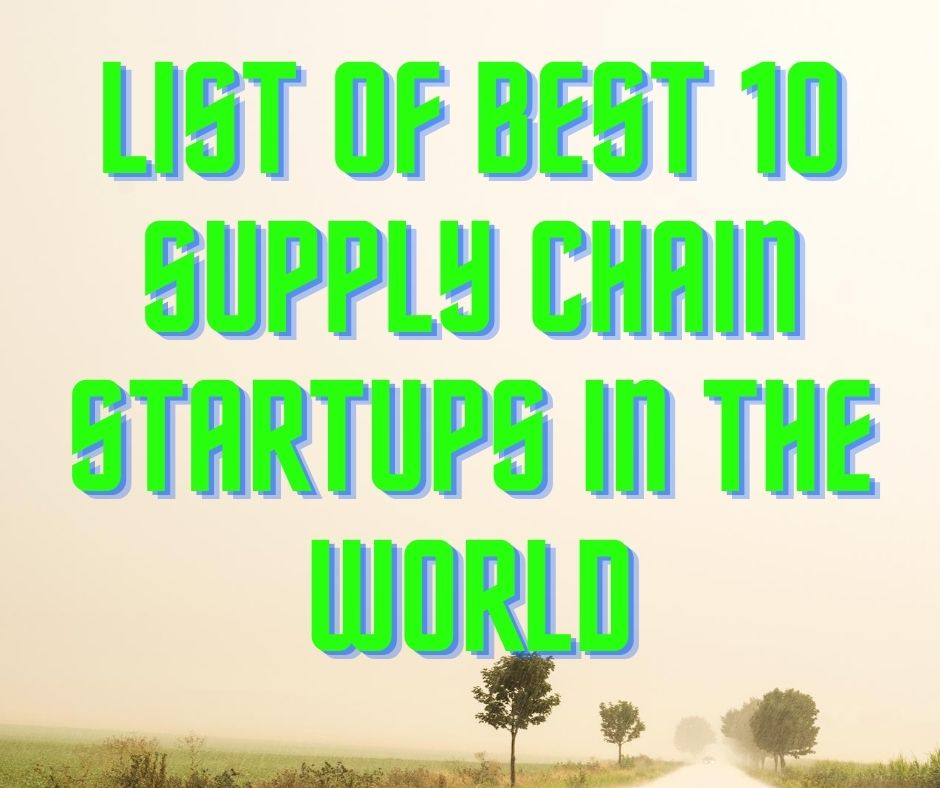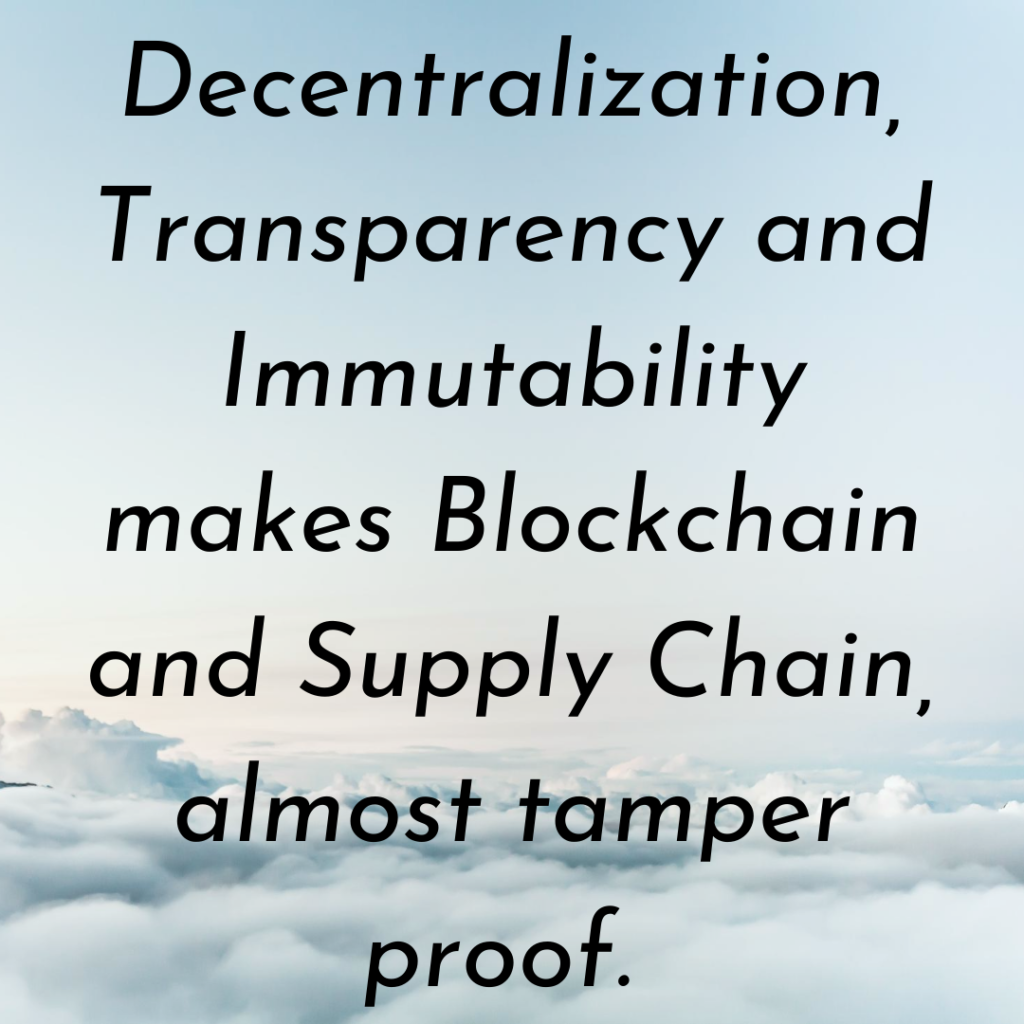List of Best 10 Supply Chain Startups in the World
- 6 August 2020 | 1331 Views | By Abhinav Mishra

Blockchain technology has the potential to increase the profitability and effectiveness of most businesses in the coming years. In this article, we are going to talk about companies working in the supply chain and using blockchain technology.
What is Blockchain Technology?
The term blockchain is a combination of two words – block and chain – It is “blocks” of immutable and validated transactions and how they link together in chronological order to form a “chain”. It is an internet-based technology that has the ability to publicly record, validate, and distribute transactions in immutable, encrypted ledgers. Since the ledgers and the transactions are encrypted, blockchain technology offers more security than the banking model.
Since it uses the internet, it does instantaneous transmission which eliminates banks’ or companies’ two to three-day clearing process and accompanying costs for transferring money from one account to another.
Blockchain in Supply chain
In supply chain management, the participants are usually not known or trusted. Given this fact, blockchain technology can add transparency, trust, and traceability. The supply chains are complex since they involve many parties, multi-tiered and they operate in a regulated environment that demands a higher level of traceability. Blockchain can make the supply chain process simple and less time-consuming.
How Blockchain can improve the supply chain?
Blockchain can drive increased supply chain transparency to help reduce fraud for high-value goods such as pharmaceutical drugs and diamonds.
Blockchain could help companies understand how finished goods and ingredients are passed through each subcontractor and reduce profit losses from gray and counterfeit market trading. It also increases confidence in end users by eliminating or reducing the impact of counterfeit products.
It will also allow businesses to maintain more control over outsourced contract manufacturing. Blockchain ensures all parties involved have access to the same information which reduces transfer data error. Using blockchain businesses will need to spend less time validating data and more time can be spent on delivering services and good. The biggest benefit will be in streamlining administrative processes which will reduce costs by enabling an effective audit of supply chain data.
Role of FinTech in Logistics and Supply Chain Management
What are the foundations of the supply chain?
There are 4 major elements or foundations of supply chain management – integration, operations, purchasing, and distribution.
Integration – Planning is very important for the success of any project and good planning consists of setting up integration which means everyone involved in the process collaborates and communicates.
Operations – Day to day operations are the backbone of the supply chain process. Under operations, managers monitor the work done and ensure everything is running as expected.
Purchase – This area makes sure a company has everything to needs to manufacture products including supplies, materials, tools, and equipment.
Distribution – The supply chain ends when the product lands on a store where the customers can buy them which happens by a well-planned shipping process.
Which companies use supply chain management?
1. RoadLaunch
Blockchain can address traceability challenges and can bring transparency to the entire logistics processes. RoadLaunch used this fact and they developed Factr, a digital wallet integrated with their RoadLaunch Intelligent Digital Logistics platform. The solution enables simple transactions for shippers, freight carriers, intermediaries, and finance partners who can make decisions based on transaction history and digital documents. Factr also provides instant cross border settlement, transaction validation, audit, and reconciliation.
2. AXenS
AXenS builds trust in trade service and payment. It provides a platform that is designed for distributed supply chain finance and distributed trade services. This startup provides the best in the class secured the automation process for the trading transaction and secured management of data and documentation involved in the business. To make the working process more efficient, the transaction network used by AXenS closely integrates the financial supply chain and physical supply chain.
3. OpenPort
OpenPort is solving one of the biggest challenges in the supply chain process – the cash flow problem. Proof of Delivery (POD) usually consists of paper records that can be disputed and are slow. This results in unsatisfied customers and it delays the cash flow between shippers, retailers, and transporters. They bring blockchain technology in the ecosystem to create an immutable ePOD with an indisputable record of the freight’s history, linked to a digital agreement. Digital payment via OpenPort’s token, made upon fulfilling the conditions of the successful ePOD and smart contract, drastically accelerates the payment cycle to the benefit of all parties.
4. CargoCoin
Traditional contracts need to be validated and verified by third parties which are costly as well as time-consuming. These contracts are being replaced by smart contracts, which allow the performance of credible transactions once the codified pre-requisite conditions are met and without third parties. CargoCoin links the physical world of transport, trade, and logistics with blockchain technology by replacing paper documents with smart contracts and providing secure payments throughout the process. CargoCoin is designed to provide a smart contract and cryptocurrency platform which will enable automation in approving documents and securing transactions to eliminate the information barriers and the problem of mistrust.
5. Zeto
Zeto is the best in class food safety solution provider. It is a software company providing food safety solutions in the refrigeration and retail industries. They are a blockchain-based supply chain company that offers scalability in food safety. They aim at increasing trust and transparency, waste prevention, and saving money and complying with the food safety standard. The blockchain implementation allows the IoT sensors to be applied to every link in the chain which makes sure temperature data is stored securely in the blockchain. They have a mobile application to keep track of the complete product history.
6. Bonafi
Recognition and elimination of counterfeiting is a herculean task because of the involvement of many participants in the supply chain. Bonafi develops solutions to solve the problem of counterfeit products by integrating its Crypto-tag and a mobile application using blockchain technology. This tag can be put into any type of material. This tag records data as each item moves through the supply chain. Third-party sellers and consumers then scan products with their mobile devices to verify their authenticity and register the purchased goods.
7. Curv
Safety is a major concern in the supply chain. Blockchain-based decentralized networks distribute the digital ledger over many servers of authorized stakeholders which ensure a high level of network security. Curv provides a cloud-based Institutional Digital Asset Wallet Service to the companies. Curv alleviates the blockchain’s irreversible single point of failure by removing the concept of private keys which lets users sign transactions in a secure, distributed way. They have mathematically-proven multiparty computation (MPC) protocols that protect against insider collusion and cyber-attacks, ensuring each transaction is validated against a predefined policy and every user is authenticated.
8. OriginTrail
OriginTrail is an ecosystem dedicated to making supply chains work – through championing standards supporting a universal data exchange, connecting rather than replacing legacy IT systems and ensuring data immutability by utilizing the blockchain technology. They designed the protocol with the main object of enhancing the veracity and integrity of the supply chain data. The blockchain-based data insights help both the supply chain leaders and IT providers. The protocol designed by OriginTrail allows exchanging data seamlessly between companies with the utmost integrity and safety.
9. T-mining
T-Mining enables logistic platforms to develop blockchain-based software solutions by leveraging a number of ready-made components. They use a governance toolkit for decentralized networks, a library of proprietary smart contracts designed for logistics, and APIs to integrate with existing software and increase interoperability. They have a smart contract framework that allows platforms to implement the benefits of decentralization and thus enable innovative applications. This lets existing platform operators extend their service package to their community, based on the T-Mining framework.
10. SKYFchain
SKYFchain is an operating system for the cargo robot industry. They have a blockchain database to verify the operations and compliance of automated systems in the supply chain industry. As more and more steps in logistics are executed by robotics, AI, and replicable machine workflows, SKYFchain aims to implement blockchain as a governance layer for these increasingly important technologies.
The future of blockchain in the supply chain
The blockchain has the potential to transform the supply chain and disrupt the way companies produce and market and we purchase and consume the goods. The added transparency, traceability, and security to the supply chain can go a long way toward making the economies safer and much more reliable by promoting honesty and trust and preventing the implementation of questionable practices. There are a lot of companies in this space and while there isn’t any clear winner in the supply chain space, many companies are setting themselves apart.
What company has the best supply chain?
According to Gartner, Inc., the best supply chain company is Colgate-Palmolive. Colgate-Palmolive scored the top spot in the ranking for the first time followed by Inditex, Nestlé, PepsiCo, and Cisco. The Chinese e-commerce company, Alibaba, Akzo Nobel, joined the Supply Chain Top 25 for the first time.
Can the Blockchain be hacked?
No, the blockchain technology is nearly impossible to hack because of its cryptographic algorithm and decentralized nature. Hacking a Blockchain is close to impossible because once a transaction has been sealed into a block and added to the Blockchain, changing it is close to impossible. Hacker has to reverse engineer the hashed block and make a change to the transaction data contained within. This he has to do simultaneously over at least 51% of the copies of the ledger held on different nodes which is not possible.










